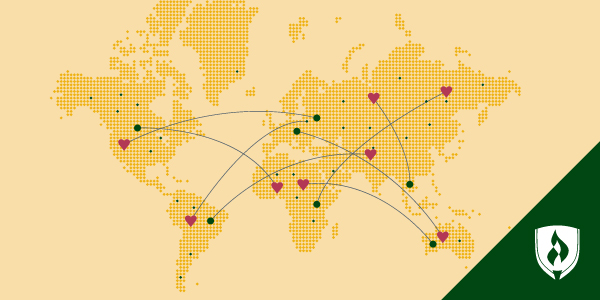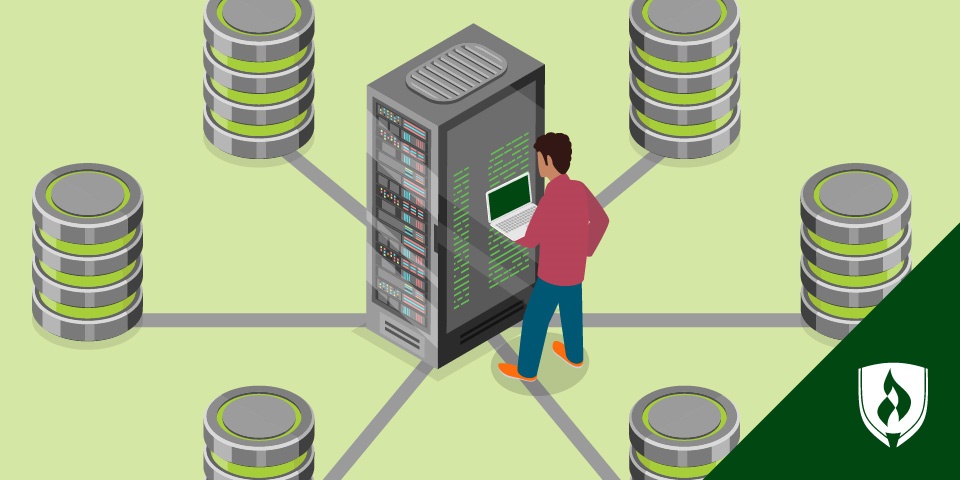
You’ve had your eyes peeled for a new career path that makes good use of your skills, presents a fun challenge and offers opportunities to take your career to new heights. After all that research, one job title stands out from the rest: software developer.
This in-demand tech career is well worth considering. The Bureau of Labor Statistics (BLS) projects 31 percent employment growth for software developers from 2016 to 2026—that’s more than three times the national average!1 This is one career path where you can put your natural tech talents to work for employers who are seeking the best software developers to keep up with industry growth.
Now that you’ve got your eyes set on an exciting career option, you just need to know how to become a software developer, so you can start turning your dream career into a reality.
How to become a software developer
Choosing to become a software developer is the first step toward your new career, but you need to know what to do next. We’ve spoken to industry experts and rounded up the latest data so you’ll know exactly how to start your journey toward landing a job in software development.
Have a passion for coding
“Aspiring developers need to love learning and have a passion for coding,” says Mark Runyon, senior consultant for Innovative Architects. Software developing requires you to spend much of your day working with code or thinking about creative ways to solve problems with code. You’ll enjoy your work more and stand out from others in the field if you have a passion for coding that drives you to excel.
“Technology is constantly evolving,” Runyon adds. “You have to want to explore the new technologies and discover new ways of doing things to be successful as a software engineer.” In the fast-paced tech industry, a true love of coding will give you motivation to keep your skills up to date.
Brush up on your tech skills
Speaking of skills, software developers need to enter the workforce with a solid set of tools at their disposal if they want to stand out to employers. “Pick a stack (a set of technologies and tools used to create and run software) and get really good at it,” advises Scott McGillivray, chief technology officer for Pop-Art.
The exact coding skills and languages you’ll need will vary depending on the workplace, but it helps to know what languages are most commonly sought after from employers. We used real-time job analysis software to identify the top five technical skills employers are looking for in their software developers:2
- Java™
- SQL
- JavaScript™
- C#
- Python
Be a star communicator
Technical skills are essential to a career as a software developer, but soft skills that allow you to work on a team and creatively solve problems can be just as important. “I'm far more interested in the ‘unteachable’ qualities, like initiative, curiosity, collaboration, communication style and cultural match,” McGillivray says.
Austin Norby, software developer with Blue Star Software, says communication is a key trait for software developers.
“Developers need to be able to communicate their understanding of their ideas, translate them into code and engage in a continuous feedback loop until the product is completed,” Norby says.
Curious about what other soft skills you’ll need? Our analysis shows these as the most in-demand soft skills for software developers:2
- Communication
- Collaboration
- Problem solving
- Troubleshooting
- Research
Gain experience
Taking initiative to create relevant work samples and gain experience can be the difference between landing your dream job and heading back to the drawing board.
“As a guy who's seen a lot of resumes, I can say that the ones that get my attention have links to actual, running samples of the developer’s work,” McGillivray says.
Just because you haven’t been hired yet doesn’t mean you can’t build up a portfolio of your best coding work. Runyon suggests turning coding into an after-hours hobby that’s both fun and expands your skills. “I usually have a few side projects that I work on for fun. It can be a new technology that I want to try out or putting together a cool piece of software to solve a personal need.” In addition to improving your coding prowess, this practice can also show employers you have the committed, passionate mindset they’re looking for. Developers looking to gain additional experience should look into getting involved with open-source projects—they’re an excellent way to contribute to something tangible and learn along the way.
Earn a Bachelor’s degree
Some software developers are able to land a job without a four-year degree, but our research has shown us that’s no longer the norm. A Burning-Glass.com analysis of software development job postings found that 91 percent of employers prefer their software development candidates to have a Bachelor’s degree.2 The BLS agrees, saying that most software developers typically have a four-year degree in Computer Science or a related field.1
While a degree isn’t everything in a field where you can show what you know relatively easily, employers still use it as a litmus test to weed out underqualified candidates. Your best bet at becoming a software developer is to combine real-world technical skills with a Bachelor’s degree to show employers you have the passion, commitment and technical know-how to get the job done.
Go land your dream job
There’s no doubt about it: software development is the place where your passions and talents combine to make a career you can get excited about. Now that you know how to become a software developer, it’s up to you to take the first step toward this in-demand career.
The data doesn't lie. If you want to be eligible for 90 percent of software developer job openings, you're going to need a Bachelor's degree. Learn more about how a degree in Computer Science can qualify you for these coveted positions.
Related Articles:
- Programmer vs. Developer: Cracking the Code Behind Commonly Confused Career Paths
- Women in Tech Share 5 Tips for Succeeding in a Male-Dominated Field
- What Is a Webmaster and Do They Still Exist?
- Working From Home and Information Technology: How Remote Work Is Changing IT
- 11 Technology Documentaries on Netflix to Stream in 2019
1Bureau of Labor Statistics, U.S. Department of Labor, Occupational Outlook Handbook, [career information accessed August 17, 2018] www.bls.gov/ooh/. Information represent national, averaged data for the occupations listed and include workers at all levels of education and experience – employment conditions in your area may vary.
2Burning-Glass.com (analysis of 402,213 software developer job postings by education, July 01, 2017 – June 30, 2018).




